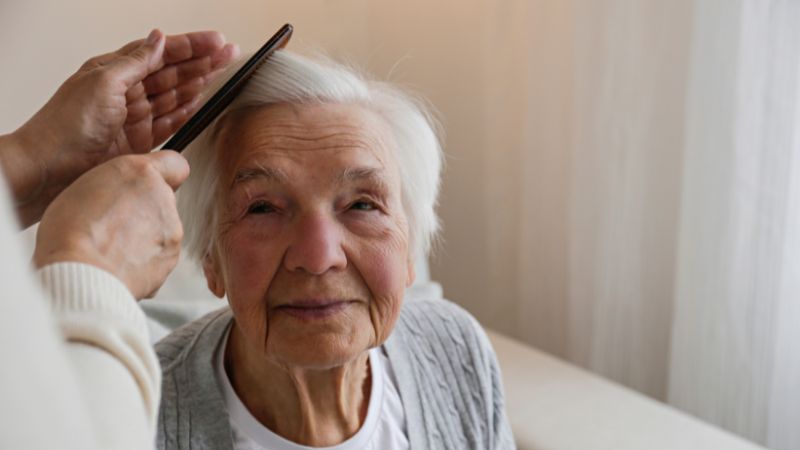
Dementia is a condition that primarily affects older adults. By 2050, it is expected that 100 million adults worldwide will be diagnosed with this progressive brain disease. Seniors can reduce their risk of developing dementia, however, by participating in enjoyable leisure activities.
What is dementia?
An umbrella term that describes a group of symptoms affecting memory, thinking, and judgment, dementia can interfere with a senior’s functioning in daily life. Dementia itself is not considered a specific disease; rather, several diseases, like Alzheimer’s disease, can cause dementia.
Multiple cognitive changes occur when dementia strikes. Seniors experience memory loss that is noticeable by others. Communicating, or finding the right words, becomes challenging for dementia patients. The senior may get lost while driving, since spatial and visual abilities decline.
Other cognitive impairments develop when dementia strikes, such as difficulty problem-solving, reasoning, handling complex tasks, and feeling confused or disoriented. Psychological changes that occur in dementia patients include depression, anxiety, paranoia, agitation, and hallucinations. The affected senior’s personality can also undergo a change.
As a disease of the brain, dementia develops as a result of both genetic and environmental risk factors. Since genetic risk factors cannot be altered, it is important for seniors to focus on the environmental risk factors that can be changed to delay or prevent dementia.
General public consensus as well as scientific studies determine that keeping the brain active alters seniors’ risk for developing dementia. In fact, in observational studies, a lower risk of dementia is correlated with high engagement in cognitively stimulating leisure activities.
The elderly may participate in numerous divergent leisure activities that stimulate the brain, from reading alone to playing card games with a group of individuals. Mental, physical, and social activities are known to reduce the risk of developing dementia in seniors who actively engage in them.
What mental activities lower the risk of dementia?
Seniors, whether physically able or homebound, have an opportunity to participate in several mental activities to exercise their brain. Reading is an accessible leisure activity. Older adults may opt to read newspapers, books, magazines, or browse articles on the internet.
Additional mental activities that have positive effects on the aging brain include watching television, listening to the radio, or playing a musical instrument. Seniors might also challenge their minds by working on crossword puzzles or jigsaw puzzles and writing calligraphy.
Older adults will find pursuing a hobby, such as painting or engaging in handicrafts, to be not only enjoyable but a strong contributor to a healthy, aging brain. Caregivers are instrumental in providing the senior with resources, such as artistic supplies, and encouraging participation in the hobby.
What physical activities lower the risk of dementia?
A 17 percent lower risk for dementia is found in older individuals who remain physically active. Exercise has benefits on not only the physical body but the aging brain. Being physically active keeps blood flowing to the brain and increases the chemicals that protect the brain.
Exercise is a modifiable risk factor for dementia—meaning that seniors who engage in enjoyable physical activities on a regular basis are able to keep dementia at bay. Exercise may be as simple as walking, hiking, stair climbing, bicycling, swimming, or participating in group exercises.
What social activities lower the risk of dementia?
Staying social is also known to reduce a senior’s risk for developing dementia by about 7 percent. Leisure activities with a social component include both mental activities and physical ones. The elderly may play games, like bridge or checkers, with peers or caregivers.
Physical exercises, too, can have a strong social element. Leisure activities seniors enjoy include playing ballgames with others or racket sports. Dancing with a partner is a social activity that combines physical exertion and leisure. Yoga classes, too, are excellent ways to incorporate exercise and sociability.
Other social activities seniors may leisurely pursue include volunteering with an organization in need. Contributing a few hours per week to a meaningful cause can introduce seniors to likeminded individuals and give them a sense of purpose, all of which help lower the risk of dementia.
Seniors may also have an interest in participating in organized group discussions. As they contribute to the topics being discussed, they stimulate their minds and remain social. Similarly, attending religious activities provides older adults with a social outlet and another way to improve cognitive functioning.
Mentally, physically, or socially stimulating leisure activities lead to the reorganization of neurocognitive networks and reduce the effects of stress hormones on the brain. Active seniors who are surrounded by an enriching environment, therefore, have a lower risk for developing dementia.
The research on how leisure activities improve a senior’s cognitive functioning is encouraging. Seniors are therefore urged to incorporate enjoyable activities into their daily lives to ward off or slow the progression of dementia. Professional caregivers from Assisting Hands Home Care can also help.
We are a leading home care agency staffed with dedicated caregivers who specialize in non-medical Alzheimer’s and dementia care. Our memory caregivers compassionately support dementia patients who are prone to wandering, have bouts of incontinence, become agitated, or experience forgetfulness.

Dementia caregivers from Assisting Hands Home Care ensure the safety and well-being of seniors living with dementia or Alzheimer’s disease. We meet all their basic needs on a daily basis, from hydration to nutrition and mental stimulation. Caregivers join seniors in leisure activities or recreational pursuits.
Our comprehensive non-medical home health care supports seniors in the activities of daily living. Responsibilities include help with personal hygiene tasks, meal preparation, transportation, light household chores, and medication reminders. Our pleasant companionship prevents dementia patients from feeling lonely and isolated.
Assisting Hands Home Care is available to meet the daily memory care needs your elderly loved one requires. We offer flexible scheduling and care options to families with seniors living in Deerfield, Buffalo Grove, Grayslake, Highland Park, Lake Forest, Lake Zurich, Libertyville, Lincolnshire, Mundelein, Round Lake Beach, Vernon Hills, IL, and surrounding communities. When you need quality home care, choose us. Call us today at (224) 268-9068 to schedule an in-home consultation.














